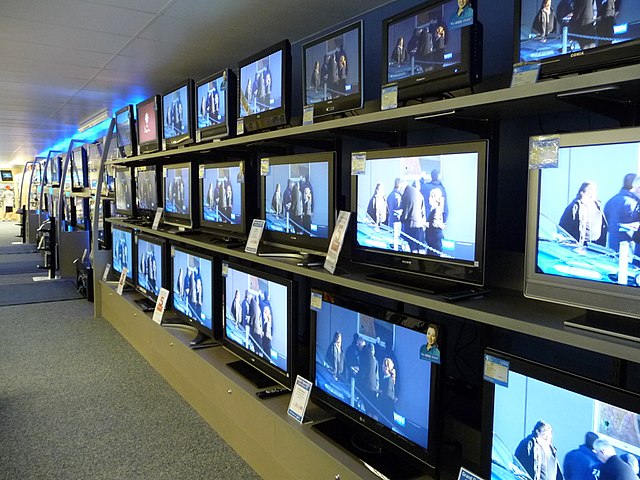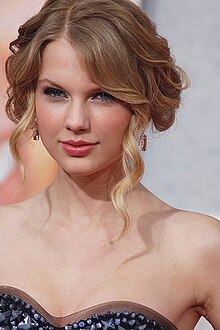Portal:Television
Portal:Television

Television (TV) is a telecommunication medium for transmitting moving images and sound. The term can refer to a television set, or the medium of television transmission. Television is a mass medium for advertising, entertainment, news, and sports.
Television became available in crude experimental forms in the 1920s, but only after several years of further development was the new technology marketed to consumers. After World War II, an improved form of black-and-white television broadcasting became popular in the United Kingdom and the United States, and television sets became commonplace in homes, businesses, and institutions. During the 1950s, television was the primary medium for influencing public opinion. In the mid-1960s, color broadcasting was introduced in the U.S. and most other developed countries.
In 2013, 79% of the world's households owned a television set. The replacement of earlier cathode-ray tube (CRT) screen displays with compact, energy-efficient, flat-panel alternative technologies such as LCDs (both fluorescent-backlit and LED), OLED displays, and plasma displays was a hardware revolution that began with computer monitors in the late 1990s. Most television sets sold in the 2000s were flat-panel, mainly LEDs. Major manufacturers announced the discontinuation of CRT, Digital Light Processing (DLP), plasma, and even fluorescent-backlit LCDs by the mid-2010s. LEDs are being gradually replaced by OLEDs. Also, major manufacturers have started increasingly producing smart TVs in the mid-2010s. Smart TVs with integrated Internet and Web 2.0 functions became the dominant form of television by the late 2010s. (Full article...)

The Jacob's Awards were instituted in December 1962 as the first Irish television awards. Later, they were expanded to include radio. The awards were named after their sponsor, W. & R. Jacob & Co. Ltd., a biscuit manufacturer, and recipients were selected by Ireland's national newspaper TV and radio critics. Jacob's Award winners were chosen annually until 1993, when the final awards presentation took place.

- ... that Valley Public Television once raffled off a 1961 Rolls-Royce Silver Cloud, according to the wishes of the man who bequeathed it to the station?
- ... that Phoenix radio station KTAR bought television station KTYL-TV to avoid a conflict with former U.S. senator Ernest McFarland?
- ... that television production companies working in Bhadun, Bangladesh, can hire a local woman as an extra for ৳500 (US$5.30) per day?
- ... that financial troubles at a television station in Florida led to the bankruptcy that caused the 1994 demise of Mississippi radio station WHSY?
- ... that Angeline Quinto became the first Filipino singer to release a soundtrack album for a television series that featured a single artist?
- ... that WTVK in Knoxville, Tennessee, won a years-long battle to move from UHF to a VHF channel, only to be sent by new management to "that big TV station in the sky"?
- ...that the book The Psychology of The Simpsons uses this TV series to analyze topics in psychology including clinical psychology, cognition and Pavlovian conditioning?
- ...that Molly Badham, co-founder of Twycross Zoo, trained the chimpanzees who appeared in the long-running Brooke Bond PG Tips television advertisements?
- ...that Augie Hiebert not only built Alaska's first television station, KTVA, but also founded the state's first FM radio station, KNIK-FM?
- ...that Olivia Newton-John made at least 16 appearances on The Go!! Show, an Australian popular music television series which aired between 1964 to 1967, before she found international success?
- ...that a Spokane, Washington, television station devoted the first 11 minutes of its Saturday evening newscast to the February 2007 arrests of Gonzaga University basketball player Josh Heytvelt and his teammate?
Aaron Benjamin Sorkin (born June 9, 1961) is an American playwright, screenwriter, and film director. Born in New York City, he developed a passion for writing at an early age. As a writer for stage, television, and film, Sorkin is recognized for his trademark fast-paced dialogue and extended monologues, complemented by frequent use of the storytelling technique called the "walk and talk". Sorkin has earned numerous accolades including an Academy Award, a BAFTA Award, five Primetime Emmy Awards, and three Golden Globes.
Sorkin rose to prominence as a writer-creator and showrunner of the television series Sports Night (1998–2000), The West Wing (1999–2006), Studio 60 on the Sunset Strip (2006–07), and The Newsroom (2012–14). He is also known for his work on Broadway including the plays A Few Good Men (1989), The Farnsworth Invention (2007), To Kill a Mockingbird (2018), and the revival of Lerner and Loewe's musical Camelot (2023). (Full article...)- December 28: US professional wrestler Jon Huber dies aged 41
- September 2: Tributes paid to recently deceased US actor Chadwick Boseman
- May 24: Japanese professional wrestler and Netflix star Hana Kimura dies aged 22
- January 16: BBC newsreader Alagiah to undergo treatment for bowel cancer
- Upcoming events
History of television: Early television stations • Geographical usage of television • Golden Age of Television • List of experimental television stations • List of years in television • Mechanical television • Social aspects of television • Television systems before 1940 • Timeline of the introduction of television in countries • Timeline of the introduction of color television in countries
Inventors and pioneers: John Logie Baird • Alan Blumlein • Walter Bruch • Alan Archibald Campbell-Swinton • Allen B. DuMont • Philo Taylor Farnsworth • Charles Francis Jenkins • Boris Grabovsky • Paul Gottlieb Nipkow • Constantin Perskyi • Boris Rosing • David Sarnoff • Kálmán Tihanyi • Vladimir Zworykin
Technology: Comparison of display technology • Digital television • Liquid crystal display television • Large-screen television technology • Technology of television
Terms: Broadcast television systems • Composite monitor • HDTV • Liquid crystal display television • PAL • Picture-in-picture • Pay-per-view • Plasma display • NICAM • NTSC • SECAM
 |
You are invited to participate in WikiProject Television, a WikiProject dedicated to developing and improving articles about Television. |
- Main projects
- Sub-projects
Television Stations • American animation • American television • Australian television • British TV • BBC • Canadian TV shows • Television Game Shows • ITC Entertainment Productions • Digimon • Buffyverse • Doctor Who • Degrassi • EastEnders • Episode coverage • Firefly • Futurama • Grey's Anatomy • Indian television • Lost • Nickelodeon • The O.C. • Professional Wrestling • Reality TV • The Simpsons • Seinfeld • South Park • Stargate • Star Trek • Star Wars • Soap operas • Avatar: The Last Airbender • House
- Related projects
Animation • Anime and manga • Comedy • Comics • Fictional characters • Film • Media franchises
What are WikiProjects?

- Place the {{WikiProject Television}} project banner on the talk pages of all articles within the scope of the project.
- Write: Possible Possum
- Cleanup: color television, Alien Nation: Body and Soul, The Sopranos, Alien Nation: Dark Horizon, Alien Nation: The Enemy Within, Alien Nation: Millennium, Aang
- Expand: Timeline of the introduction of color television in countries
- Stubs: Flow (television), Just for Kicks (TV series), Play of the Month, Nova (Dutch TV series), More stubs...
The following Wikimedia Foundation sister projects provide more on this subject:
-
Commons
Free media repository -
Wikibooks
Free textbooks and manuals -
Wikidata
Free knowledge base -
Wikinews
Free-content news -
Wikiquote
Collection of quotations -
Wikisource
Free-content library -
Wikiversity
Free learning tools -
Wiktionary
Dictionary and thesaurus
































































